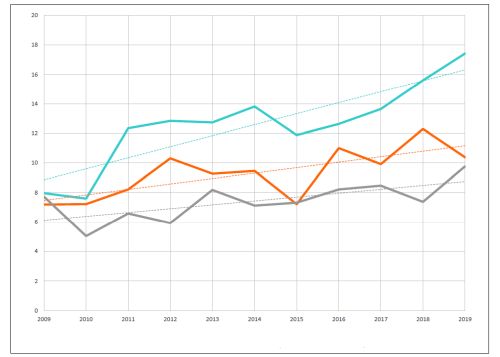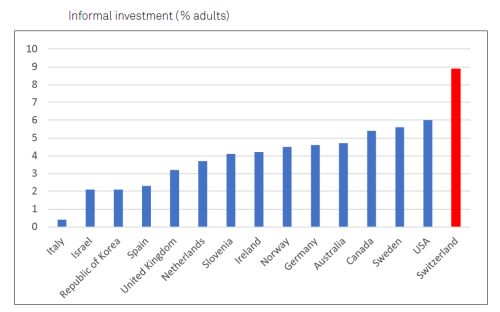
The Global Entrepreneurship Monitor has measured the Total Entrepreneurial Activity of nascent and new business owners (TEA) in several countries around the world for 20 years. In 2019, TEA in Switzerland was higher than ever before. The new Swiss edition of the GEM shows clearly the peculiarities of the Swiss entrepreneurial ecosystem and provides insights on current trends regarding women entrepreneurship.
The Global Entrepreneurship Monitor (GEM) is the largest international study on Entrepreneurship. The Swiss edition which was published this week is an annual publication of the School of Management Fribourg (HEG-FR). Around 2,500 individuals were surveyed across Switzerland.
The entrepreneurial intentions of the Swiss are higher (10.7%) than in 2018 (6.9%) and the same as in 2017. In practice 9.8% of the Swiss have acted on their entrepreneurial aspirations (total entrepreneurial activity TEA rate). This is 1.3 percentage points higher than at its previous peak in 2017 and a remarkable 2.6 percentage points higher than the 7.1 % of 2002.
Despite of this increase Switzerland ranks poorly in international comparison. Both rates are well below the average of other high-income economies. The average is 20.2% for entrepreneurial intentions and 12.3% for entrepreneurial activities. The upward trend can be observed in comparable countries too.

TEA in USA (turquoise), Netherlands (orange), Switzerland (grey), 2009 - 2019
The Swiss edition of GEM shows clearly some typical strengths and weaknesses of newly founded Swiss companies and their environment.
Starting with bigger teams: An international comparison shows that new business ideas in Switzerland are of high quality. The proportion of companies founded on the basis of good opportunities is above average (67.6%), while those born out of necessity account for only 13.9%. This explains why founders have high growth expectations: In Switzerland, the percentage of those involved in TEA who expect to create 6 or more jobs in the next five years amounts to 28.3 %. Together with the United Kingdom (28.4 %) and the United States (32.5 %), they all count almost a third of its TEA population aiming for high job growth. While remaining well under half of the TEA population, only in Ireland (40.9 %) is the expectation of such high job creation higher.
International orientation: Swiss early-stage companies seem to have a very strong international orientation. Two-thirds of newly founded start-ups in Switzerland expect to generate revenue from foreign clients. Alongside Switzerland, Sweden (28.6%), Ireland (24.3%) and Slovenia (22.8%) top the list of the most robust export-oriented start-up nations.
Informal investments: Investments made by friends, family, neighbours, etc. play an important role in Switzerland. 8.9% of business people in Switzerland have invested an average of USD 20,000 in other entrepreneurial projects in the last three years. The rate of close to 9% is clearly higher than in all comparable countries. In the USA for example which ranks second in this regard the rate of informal investors is below 6%.

Women Entrepreneurship
Overall, the proportion of men engaging in Total Entrepreneurial Activity (TEA) is greater than that of women. This gender gap narrowed in Switzerland in 2019 when there were six female entrepreneurs for every ten male entrepreneurs. This ratio of female to male entrepreneurs stood at 5 to 10 in 2018. At the same time, GEM found differences in attitudes and outlooks of women and men. Female entrepreneurs are more inclined to be motivated by the desire to make a difference in the world (46.9%) while their male counterparts are more likely to be motivated by the desire to grow their wealth or earn a higher income (46.6%). Another great motivation among the men is the continuation of a family business (20.2%). Rico Baldegger, head of the Swiss study, says, “The advancement of entrepreneurial activities in Switzerland is primarily based on the support for technology-based (often high-tech) start-ups and projects. The entrepreneurial ecosystem in Switzerland has made impressive progress in recent years, however, there remains a gender gap. The added value to an entrepreneurial ecosystem of women entrepreneurs, with their higher motivation to make a difference in the world, is shown in the new report. Thus, purpose-driven activities in, e.g. the health or social sector, or the special support of a circular economy project, could lend support to women entrepreneurs for the future. The impact of entrepreneurial activities should be the focus here.
(Stefan Kyora)























































Please login or sign up to comment.
Commenting guidelines